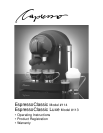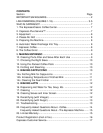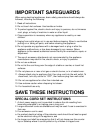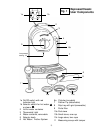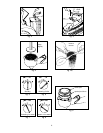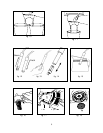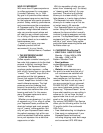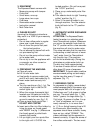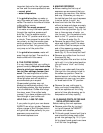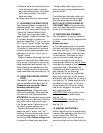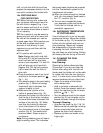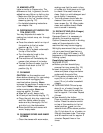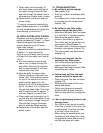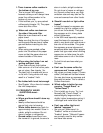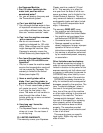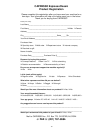
3. EQUIPMENT
The EspressoClassic comes with:
• Measuring scoop with tamper
• Porta filter
• Small sieve, one cup
• Large sieve, two cups
• Pod sieve
• Removable water container
• Instruction manual
• Mail Order form
4. PLEASE DO NOT!
(Ignoring the following instructions
may result in a VOID of your warranty
protection)
• Do not use coffee pods in regular
sieve; use in pod sieve only.
• Do not force the porta filter past
the locked position.
• Do not attempt to steam/froth with
out pre-warming first.
• Do not run the pump without water
in the water tank.
• Do not try to run the appliance with
a converter on other current or
hertz (HZ) cycle.
5. PREPARING THE MACHINE:
a.
Clean all parts.
b. Lift lid over water tank.
c. Use handle to remove water tank
and fill with cold, fresh water (fig. 2).
d. Insert water tank securely into
place.
e. Turn the machine on (fig.1; 1a). The
red indicator light in the On/Off
switch lights up.
f. When the orange thermostat light
located over the selector knob illu-
minates, the machine has warmed
up and is ready for use. (fig.1; 3)
g. Place a sieve inside porta filter –
DO NOT ADD COFFEE!
h.
Insert porta filter into filter holder by
lining up arrow on thumb guard
with INSERT line (fig. 3 ) Make sure
the thumb guard is pulled back
towards the handle.
i. Lift up slightly and turn porta filter
to the right until it CLICKS into
locked position. (Do not force past
the "LOCK" position!).
j. Place a cup underneath porta filter.
(fig. 11)
k. Turn selector knob to right "brewing
coffee" position (fig. 6 )
l. Allow 3-4 ounces of water to run
through machine. Turn the selector
knob left back to the "O"-position.
(fig. 5).
6. AUTOMATIC WATER DISCHARGE
INTO TRAY
ATTENTION:
The EspressoClassic
heats the water in a stainless steel
lined Thermoblock system. Whenever
you return the selector knob back to
the "O"-position within a few seconds
the machine will start to make noise.
This noise indicates that the machine
is discarding a small amount of warm
"rest" water from the Thermoblock
into the drip tray. (The machine
will do this automatically.) Doing this
eliminates any stale water build-up.
The drip tray holds approximately
16 ounces of water and will overflow
after about 20 cups of espresso.
IMPORTANT: To avoid water overflow
we recommend pulling out and empty-
ing the tray after every 10 cups of
espresso. (fig. 17).
7. ESPRESSO COFFEE
An espresso is a highly concentrated
coffee beverage (that is the reason, why
most people add a bit of sugar to it!)
Coffee bars use 7 to 8 grams of coffee
per cup. The small sieve (fig. 1; 10b)
holds 7 grams, the large sieve (fig. 1;
10c) holds 15 grams of coffee. A cup
or "shot"of espresso, as it is com-
monly referred to, is no more than 1
to 1 1/2 oz. Actual brewing time is 20
to 40 seconds. After brewing, the
espresso should have a dense, foamy
layer on top, called "CREMA." The
crema indicates that the espresso is
brewed correctly. It traps the aroma of
the coffee underneath. The two most
8.



